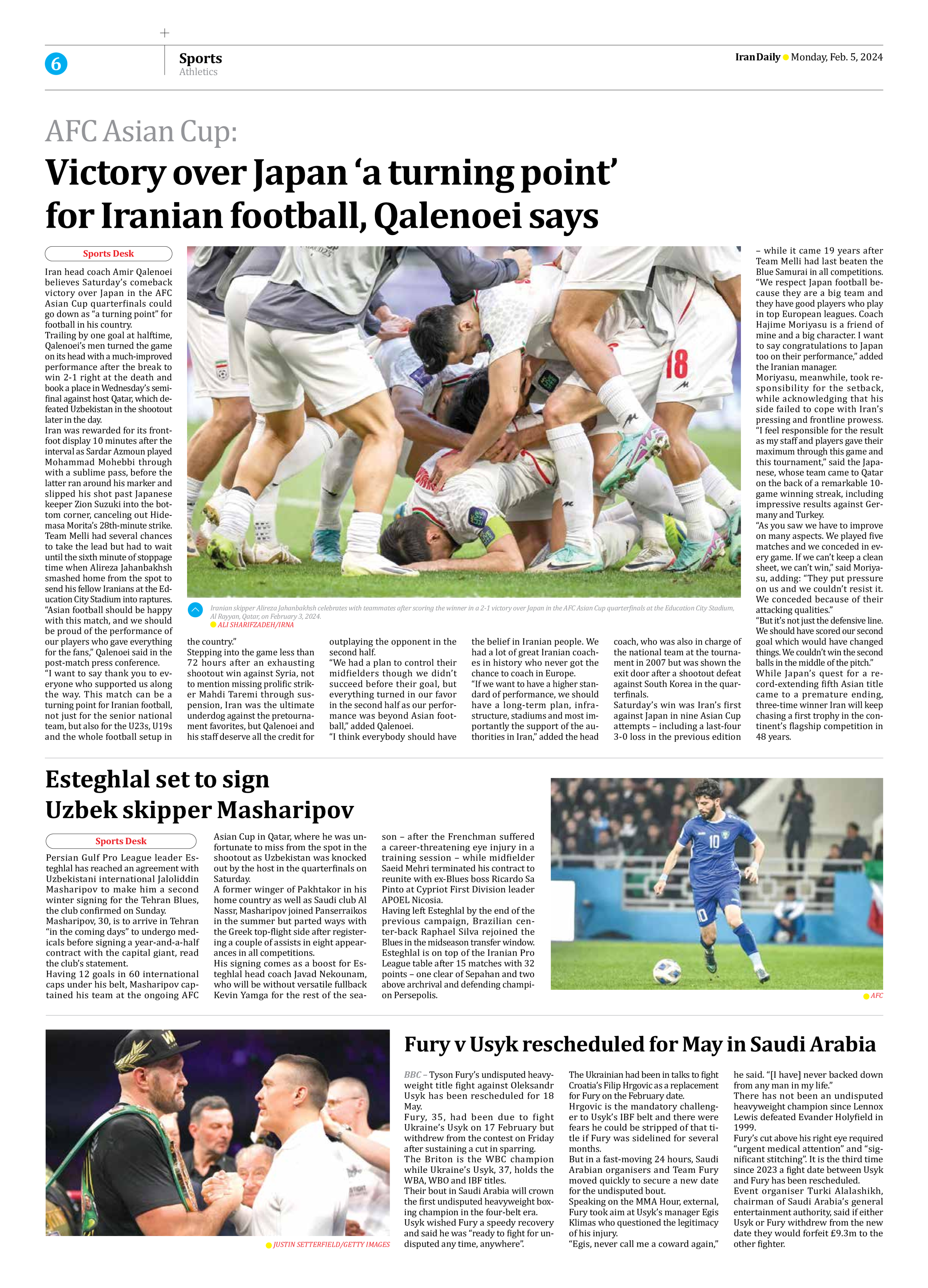
AFC Asian Cup:
Victory over Japan ‘a turning point’ for Iranian football, Qalenoei says
Iran head coach Amir Qalenoei believes Saturday’s comeback victory over Japan in the AFC Asian Cup quarterfinals could go down as “a turning point” for football in his country.
Trailing by one goal at halftime, Qalenoei’s men turned the game on its head with a much-improved performance after the break to win 2-1 right at the death and book a place in Wednesday’s semifinal against host Qatar, which defeated Uzbekistan in the shootout later in the day.
Iran was rewarded for its front-foot display 10 minutes after the interval as Sardar Azmoun played Mohammad Mohebbi through with a sublime pass, before the latter ran around his marker and slipped his shot past Japanese keeper Zion Suzuki into the bottom corner, canceling out Hidemasa Morita’s 28th-minute strike.
Team Melli had several chances to take the lead but had to wait until the sixth minute of stoppage time when Alireza Jahanbakhsh smashed home from the spot to send his fellow Iranians at the Education City Stadium into raptures.
“Asian football should be happy with this match, and we should be proud of the performance of our players who gave everything for the fans,” Qalenoei said in the post-match press conference.
“I want to say thank you to everyone who supported us along the way. This match can be a turning point for Iranian football, not just for the senior national team, but also for the U23s, U19s and the whole football setup in the country.”
Stepping into the game less than 72 hours after an exhausting shootout win against Syria, not to mention missing prolific striker Mahdi Taremi through suspension, Iran was the ultimate underdog against the pretournament favorites, but Qalenoei and his staff deserve all the credit for outplaying the opponent in the second half.
“We had a plan to control their midfielders though we didn’t succeed before their goal, but everything turned in our favor in the second half as our performance was beyond Asian football,” added Qalenoei.
“I think everybody should have the belief in Iranian people. We had a lot of great Iranian coaches in history who never got the chance to coach in Europe.
“If we want to have a higher standard of performance, we should have a long-term plan, infrastructure, stadiums and most importantly the support of the authorities in Iran,” added the head coach, who was also in charge of the national team at the tournament in 2007 but was shown the exit door after a shootout defeat against South Korea in the quarterfinals.
Saturday’s win was Iran’s first against Japan in nine Asian Cup attempts – including a last-four 3-0 loss in the previous edition – while it came 19 years after Team Melli had last beaten the Blue Samurai in all competitions.
“We respect Japan football because they are a big team and they have good players who play in top European leagues. Coach Hajime Moriyasu is a friend of mine and a big character. I want to say congratulations to Japan too on their performance,” added the Iranian manager.
Moriyasu, meanwhile, took responsibility for the setback, while acknowledging that his side failed to cope with Iran’s pressing and frontline prowess.
“I feel responsible for the result as my staff and players gave their maximum through this game and this tournament,” said the Japanese, whose team came to Qatar on the back of a remarkable 10-game winning streak, including impressive results against Germany and Turkey.
“As you saw we have to improve on many aspects. We played five matches and we conceded in every game. If we can’t keep a clean sheet, we can’t win,” said Moriyasu, adding: “They put pressure on us and we couldn’t resist it. We conceded because of their attacking qualities.”
“But it’s not just the defensive line. We should have scored our second goal which would have changed things. We couldn’t win the second balls in the middle of the pitch.”
While Japan’s quest for a record-extending fifth Asian title came to a premature ending, three-time winner Iran will keep chasing a first trophy in the continent’s flagship competition in 48 years.







